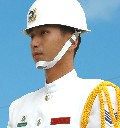| The
Martyrs' Shrine now is a tourist attraction. Visitors who
have come here all know about the famous guard mounting performance
and have admired its palace-style architecture. They usually
don't know much about the martyrs enshrined there. Therefore,
it is clear that being the ¡§national shrine¡¨ is not the
reason why the Martyrs' Shrine is so appealing to visitors.
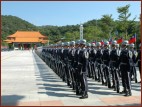 |
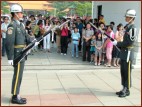 |
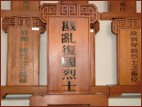 |
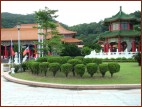 |
| The
solemn military establishment |
Watching
the guard mounting |
The
divine tablets (plaques) with martyrs' names on them |
The
Martyrs' Shrine is cleaner and more organized than community
parks |
From
a Solemn Military Establishment to a Tourist Resort
Originally, the Martyrs' Shrine was governed by the Military
History and Translation Office in the Ministry of National Defense.
In 1969, the responsibility of its administration was transferred
to the Combined Logistics Command in the same ministry, and
then to the Reserve Command in 2006. The role of the Martyrs'
Shrine is changing along with the agencies that govern it. From
a confidential archive to a management division, now it is an
office where citizens come for business. Thanks to the guard
mounting, the Martyrs' Shrine even becomes a resort for everyone
and a tourists' favorite as well.
From a National Divine Symbol
to a Historical Site
In the age of former president Chiang Kai-shek, the Martyrs'
Shrine was a respected sacred ground. However, after Taiwan
and mainland China was no longer at war and are now in a peaceful
opposition, the deceased honored in the Martyrs' Shrine are
no more limited to martyrs who had ¡§suppressed bandits¡¨ or
¡§countered the insurgency¡¨. The Martyrs' Shrine is now a
community park welcomes everyone and also becomes a landmark
and an international tourist spot in Taipei. In the Martyrs'
Shrine, you can look for the course of the history in the old
photos on display. When strolling among the magnificent buildings,
you'll feel like you're in a bright red palace in the past
century. Who won't be fascinated by it? The Martyrs' Shrine
with the solemn image as the national shrine in the old days
has been gradually transformed into a part of the citizens'
daily life.
Website Translated
by Ou Yang Pei-ting(  Top )
Top ) |
|
